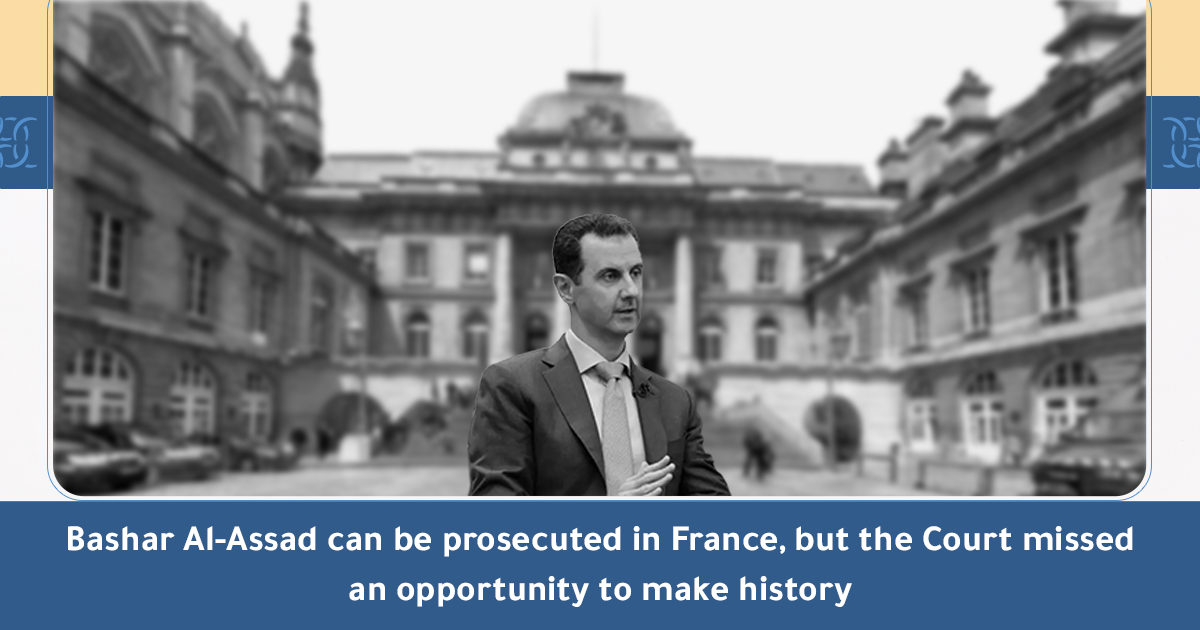Bashar Al-Assad can be prosecuted in France, but the Court missed an opportunity to make history
While the undersigned organizations welcome the long-awaited recognition that functional immunities are not an obstacle to prosecution in the presence of international crimes, they regret that the French Cour de cassation invalidated the arrest warrant for Bashar al-Assad while he was still President of Syria.
In the case concerning his role in the August 2013 chemical attacks on Douma and Eastern Ghouta, the Cour de cassation ruled that the arrest warrant violated al-Assad’s head of state immunity.
The hindrance is only temporary, however, because the Cour de cassation clarified that the investigating judges can now issue a new arrest warrant for al-Assad since he is no longer a head of state.
This decision is not about Bashar al-Assad’s direct responsibility in the chemical weapons attacks, a responsibility which is acknowledged both by the investigative judges and the prosecutor but about whether the French courts could issue an arrest warrant when he was still a head of state.
Our organizations are civil parties in the investigation and have engaged along Syrian victims in documentation of atrocities and the fight against impunity.
“This ruling represents a setback for the global fight against impunity for the most serious crimes under international law,” said Mazen Darwish, President of the Syrian Center for Media and Freedom of Expression. “The court had an opportunity to establish that head of state immunity does not apply when a leader is directly involved in perpetrating the most serious crimes; instead the ruling sends the message that immunities may still shield perpetrators from justice.”
We are disheartened that the court chose to ignore repeated calls from the international community for accountability of those responsible for the deadly chemical weapons attacks. The decision stands in stark contrast to the post-World War II rejection of impunity for heads of state, and it undermines decades of progress in holding leaders accountable for mass atrocities.
“The world has, however, set on a path toward increased accountability for leaders that commit the most serious crimes. Today’s ruling is a temporary wrinkle. Courts will have other opportunities to rule that commission of international crimes is an exception to personal immunity,” said Mariana Pena, Senior Legal Counsel, Open Society Justice Initiative.
Nevertheless, the investigation will continue looking at Bashar Al-Assad’s central role in the attacks, along with that of the three other suspects whose warrants were unchallenged, including Bashar’s brother Maher Al-Assad and two other high-ranking Syrian officials. As he is no longer head of state, we call on the investigating judges to issue a new arrest warrant for Bashar al-Assad without delay.
The attacks in question—carried out with banned chemical weapons—killed 1,400 people, including many children, and left countless others with lifelong injuries. These acts have been qualified as war crimes and crimes against humanity.
“Survivors of the 2013 chemical weapons attacks in Ghouta and Douma continue to suffer from severe, lasting health effects. The consequences of these attacks were worsened by loss of access to adequate care due to attacks on health facilities by Syrian and allied forces, as well as other forces, that destroyed Syria’s health infrastructure. While the decision to drop the arrest warrant against Assad is a setback, this case remains a critical opportunity for justice. Accountability must be pursued through the prosecution of the remaining defendants and the reissuance of the warrant for Assad,” said Houssam al-Nahhas, MD, MPH, Health and Human Rights Researcher at Physicians for Human Rights (PHR).
The arrest warrant, originally issued in 2023, had been challenged by the prosecution on account of the absolute nature of head-of-state immunity. In 2024, the Paris Court of Appeal rejected the prosecution’s argument on account of the nature of the crimes and unavailability of other justice avenues. The prosecution then referred the case to the Cour de cassation, leading to today’s decision.
Signatories:
Civil Rights Defenders
Open Society Justice Initiative
Physicians for Human Rights
Syrian Archive, Mnemonic
Syrian Center for Media and Freedom of Expression





